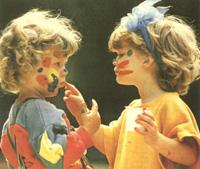Preschool preschool
In the first year of parvulario (some children start with 2 years, others with 3) there is a change for the child, especially for the one who has not gone to the nursery.
Time has passed and the child has to start at school. For many parents it is very difficult to recognize that your baby has to spend four or five hours away from home. In their day the parents, after this moment, believed that the children were too small to go to school. Today, however, it is quite known and tested if children reach an age (and the problem may be here, what is the critical age or limit: 2 years?, 3 years?) must go to school.
And those 2 years before EGB, preschoolers, are as important as all the pampering and attention you can receive at home for the child.
However, it is undeniable that a great change will occur for the child. And for this change to be positive, two factors or components must occur simultaneously:
- That in the parents the child does not perceive anguish of distance, which would cause insecurity in the child. Of course, no other extreme indifference would be the most beneficial, since the child runs the risk of understanding it as a lack of love.
- On the other hand, let the child find a good environment in school: that he is at ease, that he gets confidence in the teacher, that the atmosphere is calm and pleasant.

It should be thought that for the first time the child will be subject to a specific and concrete schedule: every day at school, at certain hours, several days a week. In this process of adaptation, of course, the child needs external support, and in this process are fundamental relations and collaboration between parents and teachers.
I will only mention the influence and importance of the teacher in this process.
The aim of these courses is to stimulate and work the sensory perception of the child, after all we refer to psychomotor education (movement, manipulation, grip, etc. ). ). All of this directly affects body awareness, the awareness of space in the learning process, etc.
Before children learn to read and write (this usually happens on E.G.B. 1. ), has to work a series of capacities and capacities, which is known as LEARNING MATURITY. And in these two years all these processes are launched.
At this time the child begins to relate to certain activities. Then they will be useful to expand your knowledge. 3 main areas:
- PREWRITING, those great lines. This way you learn to control and use the pencil.
- PRE READING, knowledge of letters and relation of the different letters with the objects.
- PRECALCULUS, notions of sets or first ideas.
In preschool programs six specific areas or departments are mentioned, although logically, these departments will be taught along with the game and daily march:
1) Language, language
Work your ear and your oral expression.
The child must learn to distinguish between noises or sounds, and then differentiate the sounds of letters and words.
The visual perception is also worked to later know the graph of the different letters.
He will also take care of his expression, respecting his personality, but correcting his pronunciation defects.
It will also work on vocabulary and direct intonation of phrases.
Finally, through the conversation, it is customary to make and say increasingly complex phrases.
2) Art
For the child to contact the aesthetic world to develop their expressive, creative, and imaginative capacities.
Through this area we want to work not only plastic, but also music and dramatizations: audiovisual and rhythm.
3) Hygiene
In this field, it is intended to reach the knowledge of one's body, the knowledge of the environment and the social world.
Here would enter some basic habits or knowledge such as health and hygiene, cleaning, dressing, moving, maintaining balance, orienting in space, ...
4) Physical education
Its content is mainly composed of psychomotor activities, h.d. a wide variety of games that will work psychomotor development.
It is about teaching children to control their body without sudden overefforts: movement, proper breathing, sensations through the skin, know that time and movement go together, ...
5) Social life
Although it is differentiated in the program, this preschool area is not specific, but it is a permanent learning that is done throughout the day and at all hours of the day.
The child will know his own identity, but at the same time he will have to realize the relationships he will have with others from now on.
- Share your games and games, toys, etc.
- Become aware of your sex. Assume the differences between boys and girls.
- Also know abstract concepts (love, good, joy, beauty, work, etc.)
- Little by little he will become aware of the social model and what is known as education or civic education: ask forgiveness, thank, ...
6) Mathematics
They have little to do with those of our time.
Through special games, the child's mind becomes familiar with logical and mathematical processes, which learn a specific language in this matter, which learns the relationships between spaces, times, numbers (numbers, quantities), shapes and structures.
Undoubtedly, everything mentioned is not limited only to school. It is very convenient to use at home toys similar to those used by the child in school. Thus, without realizing it, the child continues to study.
In addition to the material, it is important that parents LEARN with the child, even if every day is a short season.
Buletina
Bidali zure helbide elektronikoa eta jaso asteroko buletina zure sarrera-ontzian











